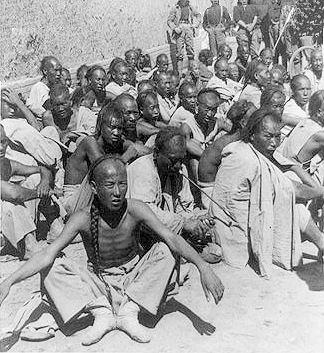
|
Boxer Prisoners Guarded by Soldiers of the Sixth United States
Cavalry
Imperial China, in the nineteenth century was in a state of decay. Accompanied
and partly responsible for the deterioration of a once powerful empire was the
increasing pressure from the West and later from Japan. The Chinese had been
badly beaten in the Opium wars with Britain (concluded in 1842) and were forced
to open Chinese ports to foreign trade and residents. The Manchu dynasty,
already ravaged by domestic rebellion, found itself powerless to resist further
demands from Western Powers and between 1856 to 1898, a network of foreign
control over the entire Chinese economy had been established.
The Triads resented this dilution of their entrenched power and in
1898, with
the support of the dowager empress who had recently retired, seized the emperor
and took control. This started a period of violent reaction that swept the
country and culminated in 1900 with the Boxer Rebellion.
The Boxers were the Triads' private armies of well trained, dedicated and
fanatically anti-foreign martial artists, inspired by the Shaolin tradition and
with an unshakable belief in their immunity to any kind of attack. Together
with the official Chinese army they initially enjoyed some success, killing
hundreds of foreigners and besieging the international settlement at Peking.
These successes were short lived however, as a Western expeditionary force,
made up of United States, British, French and Japanese troops, arrived and
lifted the siege. Large numbers of boxers, confident that their iron-shirt
training would protect them, succumbed to bullets and cannon fire before the
rebellion was finally crushed. The remaining Boxers faded away and no more was
heard of them, although it is known that many of them took refuge in
Taiwan.
|
